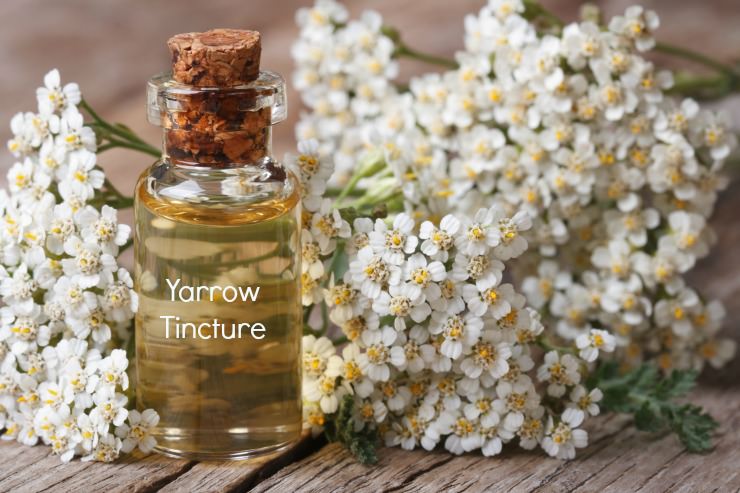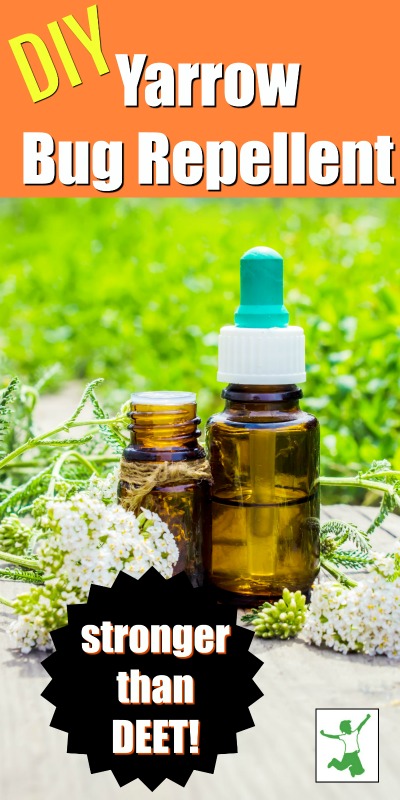Table of Contents[Hide][Show]
How to properly make and use yarrow as a broad spectrum insect repelling herbal tincture (including ticks) which has a reputation for being stronger than DEET.

My family recently spent the day at a local beach on a large lake. The horseflies proved to be very annoying and painful, which was surprising given the strong, direct sunshine in the middle of the day.
I really wished I’d brought along a small spray bottle of homemade yarrow tincture as protection.
Yarrow Herb
Note that crushing yarrow leaves and stems and rubbing them on yourself does not really work very well (neither does citronella, by the way). The yarrow potency needs to be concentrated via tincture.
Herbalist extraordinaire Susun Weed of the Wise Woman Herbal series of books says that the United States Army studied yarrow and found a tincture of this herb outperforms DEET in repelling ticks and mosquitoes.
One thing is for sure. Avoiding DEET insect repellents no matter what is a wise parenting decision.
This stuff is so highly toxic – possibly worse than even spraying neighborhoods for mosquitoes. It isn’t worth it to ever use, in my opinion.
It has been known to cause seizures in young children even at low potency. In addition, a review of the scientific literature turns up 17 cases of DEET-induced toxic encephalopathy in children (1).
The one drawback is that yarrow tincture does not remain effective as long as DEET. So, it needs to be reapplied often. I was unable to find a source for this study, so you will have to try it and see if you agree.
Ms. Weed suggests spraying yourself with yarrow tincture every 20-30 minutes if the insects are heavy. If not, every couple of hours should be sufficient.
Yarrow works for repelling horseflies and other insects that are bothering your horse when you are riding too.
How to Make Yarrow Tincture
The best tinctures are made yourself at home with freshly picked plants.
Buying a commercially prepared tincture from the store made with dried plants is not as potent.
Fortunately, finding fresh yarrow (Achillea millefolium) is not that hard as it is a common plant that grows wild all around the world in temperate regions.
It has lovely, long-lasting flowers that may be white, yellow, red, or pink. Susun Weed suggests the white or pink yarrow varieties as the best ones to tincture. She recommends picking the flowers, flower buds, seeds, stalk and leaves from the top third of the plant.
Preparing the yarrow tincture is performed as follows:
- Discard any damaged yarrow plant material
- Do not wash any of the yarrow with the exception of the roots and only with water and if necessary.
- Coarsely chop the yarrow plant parts except for the flower and buds.
- Fill a jar to the top with the chopped yarrow. You don’t leave an inch like when you are fermenting food and drinks.
- Pour in 100-proof vodka or vinegar. I would suggest vodka as a better choice because a tincture made with a vinegar base will make you pretty smelly if you spray yourself with it. Tip: use potato vodka if there is a gluten sensitivity in your home.
- Cap the jar.
- Label the jar with the date and type of plant used (yarrow).
- The next day, top up the liquid. The level will go down slightly as the plant material absorbs the liquid.
- Leave in the home medicine cabinet or on the counter for a minimum of 6 weeks.
- Strain the tincture into a spray bottle. It is now ready to use.
DIY Method Using Dried Herbs
If you absolutely cannot source fresh yarrow to make this insect repellent tincture, you can use dried yarrow. Just know that it will not be as potent and you will most likely have to respray yourself more often to achieve satisfactory results.
Note that powdered yarrow is not suitable for tinctures. You can only use the dried yarrow root, as the dried flowers, buds, stems, and leaves will not retain enough potency after drying.
Place two ounces of the dried yarrow root in a pint jar. Add 10 ounces of 100-proof vodka.
Cap and label as described above.
Top up with more vodka over the next week as necessary.
Leave for 6 weeks and then strain it for use.
Prefer to Buy?
If you are planning outdoor activities soon and don’t have enough time to brew your own yarrow tincture, there are places to buy it that are reputable.
This yarrow tincture is local to my area and a good one to consider.
Whatever source you buy from, be sure to get tincture made from the yarrow plant and not the flower itself.
How to Use
Note that a properly made yarrow tincture is appropriate as a broad-spectrum insect repellent, but especially for mosquitoes, ticks, horse flies, and deer flies (this deer fly trap is great for prevention too).
Apply liberally to areas of the body you wish to protect.
Application to clothing and hair is also effective. Take care to avoid the eyes.

References
Wise Woman Herbal Series
Herbal Adventures with Susun Weed
Herbal Pharmacy: Making a Tincture
More Information
Nontoxic Pest Control Ideas that Work
Natural Fire Ant Killer that Works FAST
Fast and Effective Fly Repellent
Attracting and Using Ladybugs for Garden Pest Control
How to Resolve a Flea Infestation Naturally
Quick and Easy Homemade Fly Trap
Spider Repellent Guaranteed to Work
Fast Acting Mosquito Bite Remedy That’s Probably Already in Your Kitchen








Can i use everclear instead of vodka? thoughts on that?
also just to clarify, don’t use fresh flowers / buds – just other parts of the plants – right?
Most definitely. It’s better as it’s more potent but you can’t find it in a lot of places.
Great recipe!
One of the best Mosquito spray recipes I’ve tried myself from a website on Susun Weed’s also is the following:
8 oz. water to spray bottle
Add 1 tablespoon of Vodka
Add 1 Teaspoon of Geranium Essential Oil (expensive oil but a little goes a long way)
Mix well and spray as needed.
In my own experience, best mosquito repellent that I’ve tried every. We live in NY and we get a lot of mosquitoes.
Hi! I began making my own tinctues for the first time last month! I made yarrow and feverfew. The only rule i did not follow was to cut the upper third of the plant. I am so excited about this! I grew the yarrow for stomach issues. But bug repellent is extremely practical! Let me just say that if I can do it, anyone can. I love herbs! What an overlooked gift from God!
Yes indeed. We need to rediscover this traditional wisdom. Too many people are poisoning themselves and their children with DEET unnecessarily.
I made this with organic vodka. Is vodka safe for topical application on babies and children?
Yes … just the same as alcohol based hand sanitizer really. Spraying clothing is very effective too in order to limit skin exposure.
Do you have access to the study conducted by the Army? I would like to give it a read if it is available. Thanks!
Just as an aside, yarrow tincture will also stop bleeding. I knew about fresh yarrow leaves for the purpose but last winter, not having any on hand and having a nice gash from a kitchen incident, I tried it instead. It worked very well (although the alcohol did sting a bit!).
Sarah, maybe you should do a post on the marvellous plantain? (plantago spp., not the banana) The leaves, mashed or chewed and put on any bug bite will bring down the swelling and relieve the pain and itch. Not that you’re likely to find the lowly plantain growing in super-clean Disney properties I suppose .. but it’s such a useful plant, I’m sure your readers would love to know all the ways it can be used.
I don’t have time to make this before I leave in one of two backpacking trips in the next 4 weeks. Can you advise a product that is similar in effectivenes that I can purchase please? I’ve had no luck with any natural varieties of repellant thus far and I absolutely hate using deet. Thanks!
better then essential oils…
SULFER hands down period…nothing better!
sulfur repels chiggers ticks and all the creepy crawlers plus ring worm….fungus.. bacterial etc..
sulfer soap or sulfer butter…sulfer powder works too but I wouldn’t recommend it on a back aneed a mask to sprinkle this fine powder. It can be used in yard and walkways.
Anyhow
BRAUFELS LAB (usa made) sulfur soap with tee tree oil…
(I don’t work for them)…been using the soap and the butter for 2 yrs now..Check out the reviews for yourself on amazon.
cheers!
don’t know what happened to my spelling, but to recap 4th line
sulfur soap or sulfur butter…sulfer powder works too but I wouldn’t recommend it on a backpacking trip plus you need a mask to sprinkle this fine powder. It can be used in yard and walkways.
Any research or information you could offer on the use during pregnancy? I am 11 weeks and looking for a good tick repellant – in hopes of still enjoying our Maine summertime!
Everything I read about yarrow and pregnancy says to avoid it due to stimulating effects on uterine muscles. Or is this pertaining to oral use, not topical?
This is topical use ONLY. Not internal.
When you leave it for six weeks does it matter if it is in a place where light can get at it or should it be in a dark place?
It doesn’t really matter.
Thanks for the great information! Side note: I read that yarrow is best to avoid with dogs if anyone is interested and wants to research further.